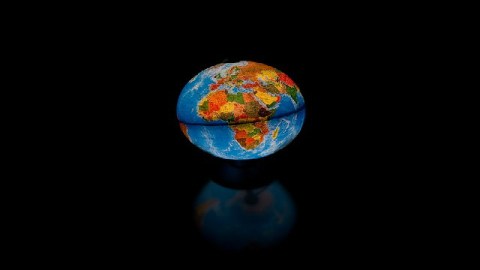Sign up for Big Think on Substack
The most surprising and impactful new stories delivered to your inbox every week, for free.
When asked last Tuesday what he considered to be the “greatest threat” to U.S. national security, the Chairman of the Joint Chiefs of Staff, General Martin Dempsey, replied:
I try not to pin myself or the country down in that regard….We live today under the threat of global terrorism….Cyber is probably the threat least known, most ignored…and eventually…could be the most catastrophic….[Nuclear] is the one capability that could literally alter our way of life and take massive casualties….I avoid oftentimes the words “greatest threat”. It’s kind of a quilt or mosaic of threats that for me adds up to something I call the security paradox: so there hasn’t been a world war in a long time, and so everybody says “whew”…unless you know what’s out there.
A more surprising answer comes from the former commander of ISAF and U.S. Forces in Afghanistan, General Stanley McChrystal: citing low high-school graduation rates as well as the prevalence of obesity among adolescents, he argued that the greatest threat is “in our schools.”
The gap between Dempsey and McChrystal’s responses suggests how little consensus there is among Americans on what constitutes the greatest threat to U.S. national security; last November, in fact, Joshua Keating posted 17 different assessments. I was curious to see how the picture changed when one extended one’s purview from U.S. security to global security. Below are some of the notable assessments that I found, grouped into five rough categories:
Terrorism
“[T]he greatest threat to U.S. and global security is no longer a nuclear exchange between nations, but nuclear terrorism by violent extremists and nuclear proliferation to an increasing number of states.” (Barack Obama, 4/6/10)“The gravest threat the world faces today…is that extremists could get hold of nuclear or radioactive materials.” (Mohamed ElBaradei, 1/2/09)“There is the most enormous threat from the combination of this radical extreme [Islamic] movement and the fact that, if they could, they would use nuclear, chemical, or biological weapons.” (Tony Blair, 9/3/10)“The spread of nuclear weapons is the greatest threat facing the country—and I would argue facing humanity.” (Joe Biden, 2/18/10)“[T]he greatest threat that the world faces is a nuclear Iran.” (Mitt Romney, 3/26/12) “Pakistan is the most dangerous country on Earth.” (Joe Cirincione, 5/9/12) “[T]here is no criminal threat with greater potential danger to all countries, regions, and people in the world than the threat of bioterrorism.” (Ron Noble, 3/1/05)Sustainability
“Sustaining growth is the century’s big challenge.” (Martin Wolf, 6/10/08) “[S]atisfying ever-growing energy demand in a sustainable way has become the world’s biggest challenge.” (Tony Hayward, 10/20/09)“This is our greatest challenge: learning to live in a crowded and interconnected world that is creating unprecedented pressures on human society and on the physical environment.” (Jeff Sachs, 4/11/07)“The biggest threat to global stability is the potential for food crises in poor countries to cause government collapse.” (Lester Brown, 4/22/09)Climate
“The most profound security threat we face today is global warming….climate change has the capacity to change the way all of us live.” (Bill Clinton, 5/10/06)Climate change “is, simply, the greatest collective challenge we face as a human family.” (Ban Ki-moon, 8/10/09)“[C]oal is the single greatest threat to civilization and all life on our planet.” (James Hansen, 2/14/09)Economics
“[T]he growing disparity in the wealth inside countries and among countries” is “the greatest challenge the world faces.” (Jimmy Carter, 1/1/12)“Chronic fiscal imbalances” are the greatest global risk over the next decade. (World Economic Forum (WEF), January 2012)Miscellaneous
“Dealing with such fractured or failing states is, in many ways, the main security challenge of our time.” (Robert Gates, May 2010)“Of all the threats to human society…one outranks all others. It is the aging of the human population.” (Jeremy Laurance, 4/10/02)“The end of the 9/11 era is our top risk for 2012….At the end of the 9/11 era, politics is driving the global economy, while economics drives geopolitics. All of this is playing out against a volatile G-Zero backdrop of global leadership in short supply.” (Eurasia Group, 1/3/12)“[T]he greatest risk to global stability over the next 20 years may be the nature of America itself. Nothing…will shape the world as profoundly as the ability of the United States to remain an effective and confident world player.” (Frederick Kempe, 4/18/12)The threat that a given phenomenon poses is generally defined as its likelihood times its impact. Here are some questions that might help to get at how individuals gauge those two variables:
What time horizon is one considering? On a related note, to what extent are one’s threat assessments a function of recent events and short-term trends vs. future possibilities and systemic drivers of change?How is impact measured? Lives lost? Monetary value of damage done? Potential to initiate a cascade of other threats? Of course, the gravity of a given threat doesn’t necessarily scale with its measurability. Take the impotence of global governance, which I noted in my last post: while it may not be the sort of challenge that makes people run for the exits, it’s difficult to think of a problem in today’s world that it doesn’t either cause or compound. Indeed, according to the WEF’s Global Risks 2012, “[g]lobal governance failure is the most interconnected of the 50 global risks—it has a direct connection with 75% of the risks covered in this report.” To what extent can the impact of the threat be mitigated, even reversed? On a related note, is a threat more pernicious if it materializes instantly, with devastating impact—but elicits a decisive policy response—or if it does so gradually, with an impact that accumulates over time—but elicits a lackluster response, perhaps even none at all? To folks who’re reading: what questions would you suggest for explaining why people’s threat assessments differ? What do you think is the greatest threat that the world faces?
Follow Ali Wyne on Twitter and Facebook.
Photo Credit: pixagraphic/Flickr.com
Sign up for Big Think on Substack
The most surprising and impactful new stories delivered to your inbox every week, for free.






